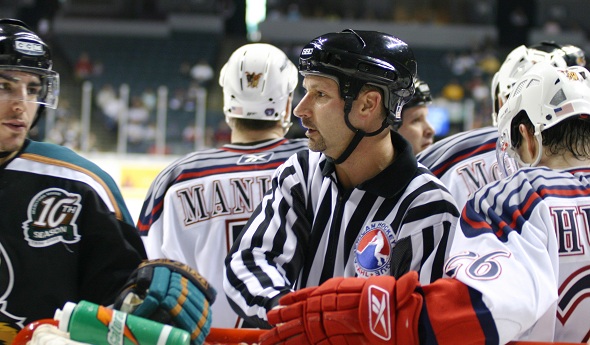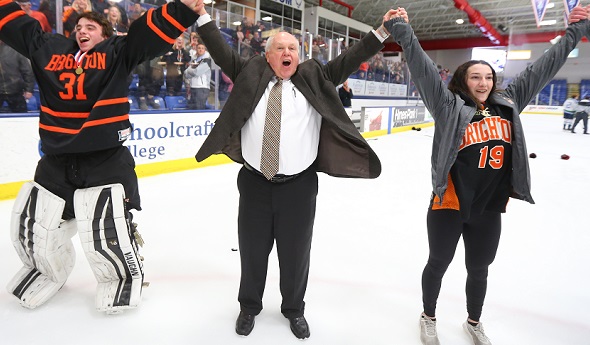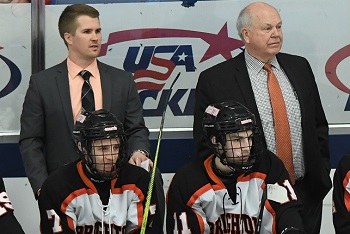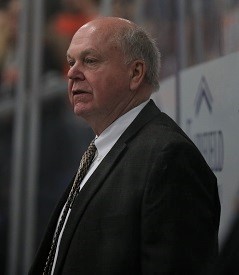
Garofalo: On-Ice Teacher and Recruiter
By
Rob Kaminski
MHSAA benchmarks editor
December 28, 2012
Something caught his eye as Allen Park’s Jim Garofalo circled the Olympic hockey rink in Salt Lake City to familiarize himself with the surroundings prior to the start of play at the 2002 Games.
“When the dimensions of a rink are laid out, everything is measured from the exact center of the ice outward,” Garofalo explains. “Usually there’s a washer or something small under the surface at center ice. All measurements are taken from there.
“Well, in Salt Lake City that year, a Canadian company was hired to prepare the sheets of ice, and they used a Loonie (common term for a Canadian $1 coin) to mark center ice. That year, the Canadians beat the United States in the gold medal game and won the Olympics on U.S. soil. I later visited the Hockey Hall of Fame in Toronto, and that Loonie is there.”
As Garofalo was getting acquainted with Canadian currency, an invitation in his mailbox back home went unanswered. At the time, MHSAA Tournament invitations were still sent by mail, so Garofalo was unaware the Association was awaiting his RSVP to accept his first Finals assignment.
“I was in Salt Lake City and had no idea. Now, of course, everything is online and by email, but that just shows how rapidly technology has progressed in the last 10 years,” Garofalo said. “So, (fellow official) Dan DiCristofaro calls and says something like, ‘Hey, do you want your state final?’ It was pretty funny; the running joke afterward was that you’ve gotta work the Olympics to get a shot at the state finals.”
Of course, that’s not the case. And, if Garofalo had it his way, all hockey officials who worked hard, persevered, paid their dues and set that as a goal would get a shot at the MHSAA Finals.
A 25-year registered MHSAA official who at one time juggled rules books for eight different hockey leagues and has worked four World Championships in addition to the Olympics, Garofalo now works only high school hockey.
“From a selfish standpoint, I suppose, I like a season that has a definite start and end to it,” says the New Boston Middle School social studies teacher, whose resume’ at one point looked like an endless Scrabble hand that included abbreviations for USA, USA Junior, Ontario, East Coast, International, International Independent and Central Collegiate hockey leagues in addition to the MHSAA.
“Being a teacher, there’s so much about the high school game that fits into education,” said Garofalo, now in his 10th year with the New Boston Huron District. “There’s so much to learn, and to help people learn at this level, from a playing and officiating standpoint.
“The people who officiate high school hockey are dedicated to improving, and as a veteran there’s an opportunity to help them learn and advance,” he says. “And, the coaches deserve kudos too. They are usually more professional and ask questions more properly than at other amateur levels. The reason is a direct result of them being accountable. They’ve got to answer to their principal or athletic director. Who are the junior and community league coaches accountable to? No one.”
 And, there’s another allure to the school game compared to which other levels pale.
And, there’s another allure to the school game compared to which other levels pale.
“The atmosphere of high school hockey is better than any other amateur level,” Garofalo says. “You go do a game at Trenton, and there’s a band. How many hockey games do you go to where there’s a band? Detroit Catholic Central and Birmingham Brother Rice have their cheering sections. It’s just a great atmosphere.”
It’s a scene that would surely help maintain the roster of younger, driven hockey officials. The trick is getting them there, according to Garofalo, one of the MHSAA’s biggest proponents for advancement and recruitment of officials.
Part of the issue is the oversaturation of games that fill Mite, Midget and other amateur schedules. Those who simply want a paycheck are never at a loss for work as long as they know how to skate.
“Hockey is unique because high school hockey is in progress at the same time as USA Hockey. An official can get twice the pay at a Bantam/Midget doubleheader than they can for one high school game,” Garofalo said. “The trouble is, who is instructing them? Who’s helping them to develop?”
To that end, Garofalo, DiCristofaro and the rest of the Northeast Hockey Referees Association established a $500 college scholarship. The recipient must be a high school hockey player who is officiating games in USA Hockey. Once they graduate from high school, many join the Association to work high school hockey.
Garofalo also offers other recruiting initiatives. In the Michigan Interscholastic Hockey League most schools play JV/Varsity doubleheaders, where the officials often let a linesman work a game at referee, while the experienced referee observes.
“At events like the Trenton Showcase, if we divide the fees differently we could get more officials involved,” he suggests. “We can do four-person crews to get our good young people some varsity experience as linesmen, and move some of our experienced linesmen to referee on the same crew with some of the top referees.”
It’s the kind of continual teaching that perpetuates the quality of officiating, and it takes time. The goal is to have the officials ready to perform when they hit the ice.
“If I put you out there to referee or pull lines, I set you up to succeed,” Garofalo says. “If I put people in too soon, I’ve set them up to fail, which leads to them leaving the game, and I haven’t done my job.”
The expectations and production of teacher and student must mesh for the system to work as intended. It requires patience as officials strive to climb the ladder, a bit of a lost art in today’s society.
“The culture of newer officials today is different. It’s a culture of immediate gratification,” says Garofalo. “Very few want to hang around eight to 10 years as a linesman before they referee, or move up. There are some very good officials who leave each year, because they haven’t become a referee, or haven’t got a tournament assignment.”
At the MHSAA Finals, Garofalo and DiCristofaro assist Jim Gagleard and the Livonia Ice Hockey Officials in heading up the off-ice officials. The inclusion and experience of such officials serves as a motivational tool which leads to improvement and retention. He also believes a four-person system in the MHSAA tournament would not only afford more qualified officials an opportunity for postseason assignments, but also provide better ice coverage as the sport’s speed has increased dramatically.
Not everyone can reach the summit, no matter the level. Even Garofalo himself, who once entertained dreams of skating in the NHL.
“The NHL looked at me a bit, but when I was at that age, it seemed all of the other linesmen were in their prime,” he said. “It is what it is.”
But, for a guy who began officiating at age 15 just to help pay for his hockey equipment, things have turned out quite well. In addition to the 2002 Olympics, Garofalo worked the Women’s World Championships in 1990, and the Men’s Worlds in Switzerland (1998), Norway (1999) and Germany (2001), working the Gold Medal game in 1998 and 1999. He’s been a fixture at the MHSAA tournament during the last dozen years.
“My wife, Mary Beth, says, ‘Wherever you go, you know someone.’ I owe that to officiating; the places I’ve gone and the people I’ve met,” Garofalo said. “It’s taken me all over the country instructing, and even overseas for some assignments. I can’t help but know people. It’s a people business.”
It might seem odd for Garofalo to even utter those words, describing the people-person this once shy kid has become. That’s one of the many rewards officiating delivers which is more valuable than any top-level assignment or game fee.
“I was quiet when I was younger. Well, when a coach is going crazy and yelling, you’ve got to speak for yourself. You learn conflict resolution,” Garofalo says, continuing as if he wrote the book on it. “‘Coach, get off the bench, quit screaming, and I’ll explain what I saw and why I called it the way I did. Then , if you have a question, I’ll answer it.’ You learn to communicate with people who don’t always agree with you.”
Then, there are the memories. Memories won’t buy a thing, but they go a long way in making 25 years on the ice, thousands of miles on the road, and countless hours away from home worth a million bucks.
“I worked 25 years for the IHL and AHL, and two years ago at the end of the regular season I was doing a Grand Rapids Griffins game. During the game, I told Brad May, ‘I’m done,’” Garofalo recalls, confiding in the gritty enforcer and one-time Stanley Cup champion who had more than 1,000 NHL games under his pads.
“At the end of the game, every guy and coach skated to me and shook my hand. Then Brad May says, ‘I heard you once worked the Olympics. It was an honor to be on the ice with you,’” Garofalo reveals, shaking his head. “Brad May said that to me.”
PHOTO: Jim Garofalo (center) officiate an NHL game. The Allen Park resident also has worked the Olympics.
NOTE: This is the sixth installment in the series "Making – and Answering – the Call" detailing the careers and service of MHSAA officials. Click the links below to view the others.

Brighton Coach's Impact 'Immeasurable'
By
Tim Robinson
Special for MHSAA.com
October 7, 2020
By Tim Robinson
Special for Second Half
Paul Moggach has never been much for looking back.
 And as he begins his first season away from the Brighton hockey program in more than three decades, he’s still looking ahead.
And as he begins his first season away from the Brighton hockey program in more than three decades, he’s still looking ahead.
“I’m thinking about what I’m going to miss more than the mark I left,” he said in a phone conversation last week. “I guess I enjoyed so much of the time I had, the opportunity to coach at Brighton, I’m thinking more how I fill the time and the things I'll miss.”
Moggach (pronounced MUG-uth) retired as Brighton’s coach this past summer after 25 seasons and having led five teams to MHSAA Division 1 championships. He compiled a record of 466-172-47 during that period.
But that’s not what he remembers most, nor why he wants people to remember him.
“I would like them to remember the teams and players who played for me and my assistants, more than me,” Moggach said. “We have so many blessings and opportunities in our lives, and hockey was one for me and hopefully for the players and assistants I worked with.”
One of those assistants was Kurt Kivisto, who joined the Bulldogs originally as a team manager more than 20 years ago and was a player at Brighton. He eventually won a national championship at Michigan State before rejoining the program as an assistant coach a decade ago.
“The No. 1 thing I’ll take from him is sticking by your beliefs and not sacrificing those beliefs for the team,” said Kivisto, who was named Moggach’s successor in September. “He sticks by those beliefs and ... he’s not willing to sacrifice that even if it could hurt the team. The character and integrity he has, how he treats people with fairness and what he believes is right is the biggest thing I’ll take.”
A stepson, Damon Whitten, played for Moggach at Brighton and at MSU before becoming an assistant coach and eventually the head coach at Lake Superior State, where he is in his eighth season.
Asked about Moggach’s impact at Brighton, Whitten said, “I’m not sure you can measure it. Your mind goes to the hockey players who have come to Brighton, and that’s a big part. But I think it goes beyond that. The money they’ve raised over the years for different families in need, for example. He’s had a big impact, and the players he had were a big part of that, but it goes well beyond that, and he did it the right way. Thirty-plus years (in the program), and I’m not sure you can count more than a handful of times where he made a bad decision or handled things poorly. He did things the right way, every day, all of the time, and I think it’s why he was so successful for so long.”
 The team’s charitable works were mostly kept under the radar – Moggach’s reasoning being his players had been given much, it was their turn to give back, and he didn’t want people thinking they did those things for publicity.
The team’s charitable works were mostly kept under the radar – Moggach’s reasoning being his players had been given much, it was their turn to give back, and he didn’t want people thinking they did those things for publicity.
Moggach joined Rick Bourbonais as an assistant at Brighton in the mid-1980s, then switched roles with him for the 1996-97 season.
He realized Brighton’s potential in the 1992-93 season, when the Bulldogs upset perennial state power Trenton in the Class A Quarterfinals before losing to Detroit Catholic Central in a Semifinal.
“That, to me, said, at least in my mind, that we can do this,” Moggach said. “It’s not impossible.”
He slowly began to build the program, getting good players and a schedule that would challenge them.
“You get the players by building a good culture,” he said. “Back in the day, when I started, we weren’t very disciplined and our league wasn’t very disciplined. So I think we realized we had to build that, and I could have an influence on building that in Brighton.”
Along with the culture, Moggach looked for an edge whenever he could find it. He was talked into making a trip to the Keweenaw Peninsula by one of his player’s parents, and found enormous benefits for his team, both competitively and in team bonding.
“It’s a lot about the little things we do,” he said, “that we find joy in, and create those opportunities. Creating the little moments really can build to bigger moments. We played capture the flag one day in about two feet of snow.
“Almost killed them,” he added, chuckling. The exhausted players didn’t have much left for the game that night, but spending time together for four days in a bus and hotel room always brought the team closer on and off the ice.
That first UP expedition also led to more teams making the trip, for team bonding and a glimpse of a part of the state, and themselves, they might never have seen otherwise.
“We didn’t do that for long,” he said. “But we always came back saying we were better together because of that experience.”
Bob Nelson had three sons play for Moggach, and Nelson’s wife, Kris, was president of the team’s booster club during their involvement over nearly a decade in Brighton hockey. Nelson also coached the program’s younger players for five seasons.
“We got to know the Moggachs really well,” he said. “It was a good experience, both as a coach and as a parent as well.”
Moggach introduced other things, including an emphasis on nutrition and off-ice training, that players resisted at first until they saw the benefits.
 He savored conversations with referees and opposing coaches before the games and even the occasional reporter after games.
He savored conversations with referees and opposing coaches before the games and even the occasional reporter after games.
But his first priority was the players. At times he would erupt in practice at a player or, more commonly, the team, and the boys soon learned to hear the message, not the volume. But for a couple of seasons, they also wrote some of his wilder statements down in a notebook after practice.
One year, they read some of them at the banquet, and after each one, Moggach’s wife, Sharon, would look at him and ask, “Did you really say that?”
Moggach would laugh and confess to remembering he had actually done so, then laughing.
“He knew part of what made the program good was his relationship to the players,” Nelson said. “If it was a good time, he wanted to enjoy it, even at his own expense at times.”
Moggach has staying in the background this offseason, letting Kivisto shape the team.
Asked if he were willing to fully switch coaching roles, as he and Bourbonais did a quarter-century ago, Moggach laughed.
“No,” he said emphatically. “Rick wasn’t in his 70s when we made the switch. Kurt needs his time. I’ll be there if he needs me.”
Moggach, who is 74, still works fulltime as the University of Michigan’s director of risk management.
He plans to spend more time with his wife and watch his grandsons play hockey, as well as catching some Lake Superior State games.
“I was really blessed to have Rick and Brownie (longtime assistant Mike Brown) along for the ride, and then to get Kurt involved,” Moggach said. “They weren’t the only ones, but they were the kids for me.
“The other thing is the support from the Brighton (High School) administration, the teachers, and our community. There are more people to thank than I could ever bring up. I do think that, all together, it was a great run. It couldn’t have been any better.”
PHOTOS: (Top) Recently-retired Brighton hockey coach Paul Moggach celebrates the 2018 Division 1 championship game win over Saginaw Heritage at USA Hockey Arena. (Middle) Former player Kurt Kivisto, left of Moggach during the 2018 Semifinal win over Detroit Catholic Central, served as an assistant before assuming the head coaching job in September. (Below) Brighton's 2018 championship was its fifth under Moggach. (Photos by Hockey Weekly Action Photos.)

